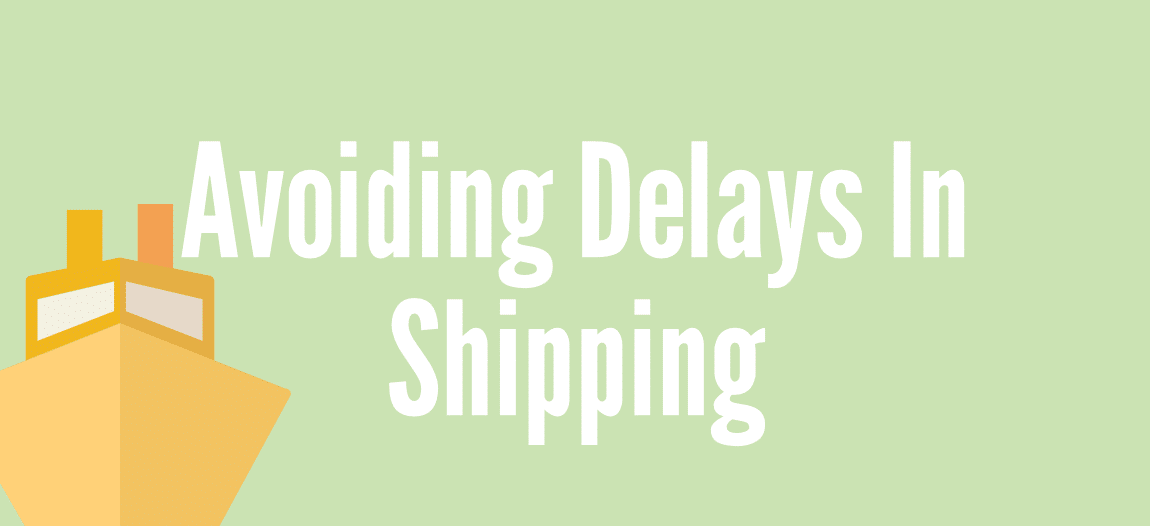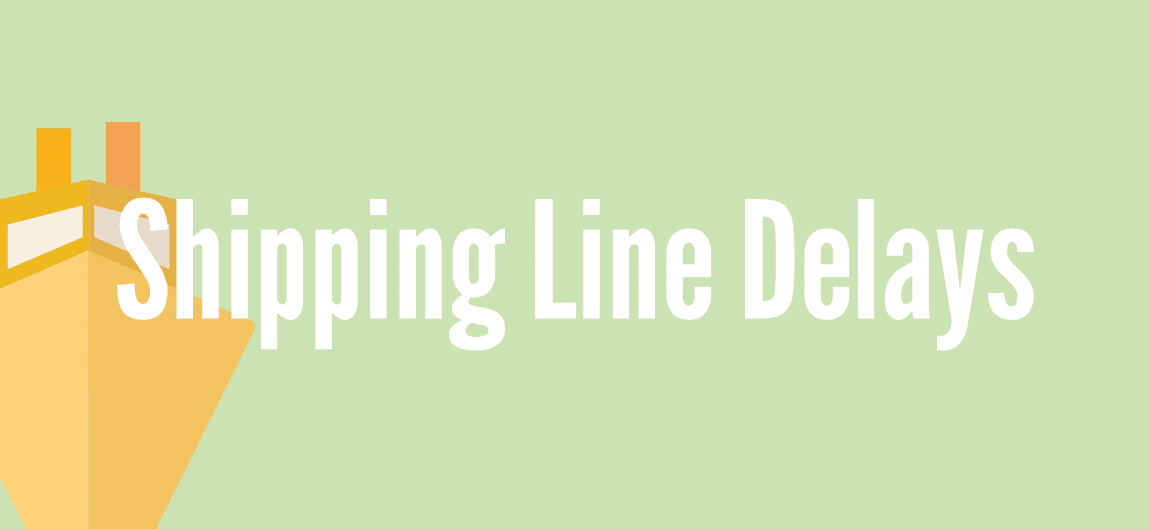
Pirates – not really a massive concern.
We all love the savings of sea freight, but avoiding shipping delays can be a worry. Shipping via sea can take up to two months from certain areas of the world – so you most definitely want to avoid any further delays in shipping!
This post is dedicated to common sea freight delays, solutions and tips, and what is within your control to avoid delays in shipping.
A bit of bad weather is possible and could delay things by a few days…. but a swash-buckling pirate leaping aboard a cargo ship and holding your goods hostage really isn’t so please don’t lose too much sleep over that!
Tips For Avoiding Shipping Delays
DELAY: UK Customs
Here’s the bad news: customs delays are the most common – and they’re the most expensive. Here’s the good news: they’re also the most easily preventable!
Most delays at UK customs can be avoided with a bit of forward planning. Make sure you have everything that you will need to hand. It may also be worth preparing a pack of documents that you may need if asked. We’ve written a post explaining what documents you need when you import to the UK and why, but here’s a brief overview:
You will definitely need:
- EORI number
- Commercial Invoice (showing the goods, their value and who’s bought and sold them)
- Tariff Code
Certain goods are subject to more scrutiny by Customs than others due to the larger risk that they carry. These items may be stopped for testing to ensure that they meet the UK’s safety standards; if this happens, your goods may be delayed for a while – and you’ll also have to pay all the charges for the tests. If your goods could be of interest to UK Customs/Trading Standards/Port Health for any reason (e.g. safety, conformity, copyright etc.) you may want to have the relevant documents from the below list ready too:
- Test Reports
- CE Certification
- Safety Certificates
- Letters of Authority
- Organic/Phytosanitary Certification
DELAY: Chinese Customs
Your supplier needs to be honest and diligent. In China, businesses can claim a tax rebate from the government (between 0 – 17%) depending on the HS code of the product when they export. Some suppliers may declare the product under the wrong code to manipulate this system; if they do this and are caught, Chinese Customs will hold up the shipment and penalise the supplier.
Even if your supplier isn’t trying to do anything naughty, not having an export license or making a mistake on the declaration can also cause delays.
SOLUTION TO CUSTOMS DELAYS: There’s not much you can do about a storm at sea but Customs delays are often avoidable. Make sure you and your supplier have everything required to declare your goods correctly.
Arguably the most important part of transporting your goods is getting them onto the mode of transport – which is why one of the most annoying delays is when your goods are delayed due to not being able to board the vessel, be loaded onto a truck or get on a flight.
DELAY: Vessels being full
This can be very frustrating during busy times or occasions when shipping lines remove capacity to drive up prices. It can also occur when demand decreases and ports decrease sailings. It’s not such an issue with less than container loads as these are normally on rolling contracts, but when you’re shipping full containers, beware. When you receive very low rates these can be “subject to space” and it’s very easy for your container to be left behind on the quay for a week or more.
SOLUTION: If you’re in a rush, make sure your rate isn’t subject to space and know the planned schedule before going ahead.
DELAY: Haulage Delays in the UK
If a truck breaks down on its way to your delivery location, a delay of anything from a few hours to a couple of days (depending on how quickly the haulier can recover it) can be caused; however there’s not a lot you can do about this.
When it comes to ensuring that the vehicle booked, can access your premises and you can unload the goods from it, you’re in the driving seat. Make sure that we know in plenty of time that you need a smaller vehicle if access is restricted at the delivery location. If you don’t have a forklift and don’t want to/can’t unload by hand then let us know and we’ll ensure you have a truck with a tail-lift to drop the goods to the floor. Not knowing this in advance can lead to vehicles being turned away and deliveries missed.
For more information about this, you may want to look at different types of delivery and decide which is best for you.
SOLUTION: Ensure you know your delivery requirements.
DELAY: Port congestion
As with any industry, there are periods of time when the demand for sea freight will rapidly increase (think, for example, the run up to Christmas) – so sometimes there will be so many people trying to get goods out that the port will become congested and, much like in a traffic jam where this isn’t enough space for everyone to get through, there aren’t enough berthing slots for the vessels..
SOLUTION: Avoid peak times
DELAY: High winds at the port
This is a safety precaution; certain types of machinery that need to be operated in a port are not allowed to be operated during heavy winds, so if the weather takes a turn for the worse, ports may not be able to operate.
DELAY: Bad weather delays vessel arriving/leaving a port
If the weather is bad at sea, the shipping lines can make a decision to not berth the vessel at the port until the weather is safe enough. This can have a knock-on effect on multiple vessels that should be berthing in the same slot and can even cause shipping lines to change their routes.
SOLUTION: Unless you can control the weather, there isn’t one! (perhaps don’t cut things too tight just in case)
Delays can also occur within the port and the lead up to getting your goods there.
DELAY: Your goods not making it to the port before the cut-off date
The first set of delays your shipment could face arise before your goods even reach the vessel. The cut-off time is the last time that cargo can be delivered to the port to meet the proposed sailing. If your goods aren’t delivered in time for any reason, they won’t be able to board the vessel – which will mean a delay while your freight forwarder arranges for an alternative.
Unfortunately, Chinese suppliers have often been known to stretch the truth; sometimes, they may claim that your goods are ready to be dispatched before they actually are. This can delay your shipment as it means your goods can’t actually be sent off as . . . well, they aren’t ready yet.
We’ve written many-a-post trying to explain just how crucial finding the right supplier is – but considering the culture and language barriers that are already in place, having a supplier who’s just a bit dodgy on top of all of that is just a recipe for disaster. Make sure you’ve done all the necessary research and are completely sure of your supplier.
SOLUTION: Make sure that you have a trust-worthy supplier and you communicate with them clearly
DELAY: Shipping lines changing their routes
This is absolutely infuriating for everyone! It doesn’t happen very often but on occasion, shipping lines decide to change their routes whilst already on them! This can mean that they offload your container and have it wait for the next vessel with space going to the port they were taking it to! This can cause delays of a week or two but is thankfully pretty rare.
DELAY: Vessels being full or under-equipped
Arguably the most important part of transporting your goods is getting them onto the mode of transport – which is why one of the most annoying and unavoidable delays is when your goods are delayed due to not being able to board the vessel because the ship is full or doesn’t have enough equipment.
Vessels being full or under-equipped is out of everyone’s hands – what you can do, however, is make sure that your goods are set to arrive before you need them to so that if this delay does occur you aren’t too far behind.
SOLUTION: This is something that is out of everyone’s control – but hopefully your shipping company will keep you up-to-date so you can plan ahead.
The next delay is another one that is easily avoidable with a bit of forward planning.
DELAY: Chinese holidays causing delays
We’ve already touched on the effects of congestion in the port, but this becomes a massive issue around national holidays – some of which will put 3 weeks’ worth of work on hold! When your suppliers and all of their logistics supply chain take a break.
SOLUTION: Put China’s holidays in your diary and plan around them.
To summarise, while there are many possible reasons for delays in the shipping process, you can easily avoid most of them by being prepared and making sure that you’ve got all your ducks in a row. Even better – get yourself a freight forwarder who will take care of everything for you! If you need help with importing via sea freight, feel free to contact us and we’d be happy to help.
Get In Touch To Ask More Questions About Avoiding Sea Freight Shipping Delays
Hopefully, this guide has given you a good idea of some of the issues you can run into with shipping, and how you can avoid shipping delays. For further information or to ask any questions, please contact us or get a quote.






